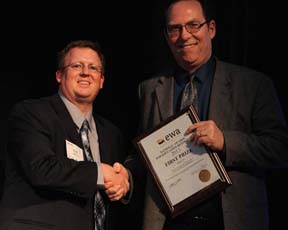Why Preschool Shouldn’t Be Like School
New research shows that teaching kids more and more, at ever-younger ages, may backfire.

Illustration by Alex Eben Meyer
Ours is an age of pedagogy. Anxious parents instruct their children more and more, at younger and younger ages, until they're reading books to babies in the womb. They pressure teachers to make kindergartens and nurseries more like schools. So does the law—the 2001 No Child Left Behind Act explicitly urged more direct instruction in federally funded preschools.
There are skeptics, of course, including some parents, many preschool teachers, and even a few policy-makers. Shouldn't very young children be allowed to explore, inquire, play, and discover, they ask? Perhaps direct instruction can help children learn specific facts and skills, but what about curiosity and creativity—abilities that are even more important for learning in the long run? Two forthcoming studies in the journal Cognition—one from a lab at MIT and one from my lab at UC-Berkeley—suggest that the doubters are on to something. While learning from a teacher may help children get to a specific answer more quickly, it also makes them less likely to discover new information about a problem and to create a new and unexpected solution.
What do we already know about how teaching affects learning? Not as much as we would like, unfortunately, because it is a very difficult thing to study. You might try to compare different kinds of schools. But the children and the teachers at a Marin County preschool that encourages exploration will be very different from the children and teachers in a direct instruction program in South Side Chicago. And almost any new program with enthusiastic teachers will have good effects, at least to begin with, regardless of content. So comparisons are difficult. Besides, how do you measure learning, anyway? Almost by definition, directed teaching will make children do better on standardized tests, which the government uses to evaluate school performance. Curiosity and creativity are harder to measure.
Developmental scientists like me explore the basic science of learning by designing controlled experiments. We might start by saying: Suppose we gave a group of 4-year-olds exactly the same problems and only varied on whether we taught them directly or encouraged them to figure it out for themselves? Would they learn different things and develop different solutions? The two new studies in Cognition are the first to systematically show that they would.
In the first study, MIT professor Laura Schulz, her graduate student Elizabeth Bonawitz, and their colleagues looked at how 4-year-olds learned about a new toy with four tubes. Each tube could do something interesting: If you pulled on one tube it squeaked, if you looked inside another tube you found a hidden mirror, and so on. ForPreschool lessons: New research shows that teaching kids more and more, at ever-younger ages, may backfire.:




